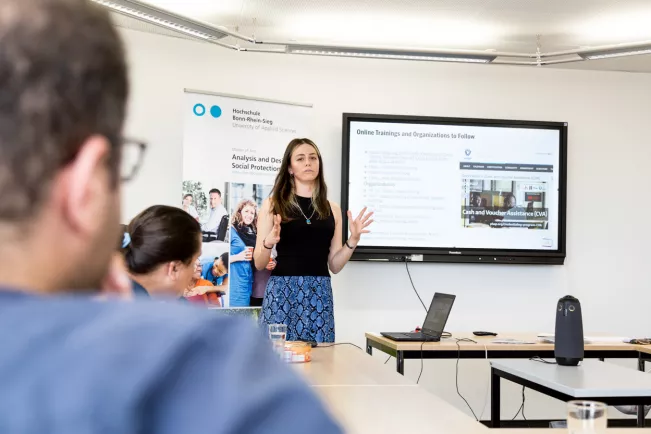Social Protection (MSc)
Career Prospects - MSc in Social Protection

-
Ministries and government agencies (Ministries of Social Affairs, Labor, Social Security, Health, Education, Community Development, Planning and Finance, etc.). With social protection systems growing in low- and middle-income countries, the demand for generalists in various departments, ranging from planning to implementation and evaluation, will be high. In countries with more refined and complex social protection systems, graduates will have greater chances in departments in charge of system design, system analysis or departments dealing with international topics.
-
Social security institutions and other membership organizations. According to the latest World Social Protection Report, a good number of risks remain uncovered or only partly covered in low- and middle-income countries. There will be a general need to beef up capacity. Social security institutions in high-income countries are also strengthening regional and international exchange through fora such as ISSA and they are engaging in exchange with low-income countries (see for instance the growing international portfolio of the German Accident Insurance).
-
Non-governmental organizations providing or advising on social protection services, predominantly with a focus on supporting social protection systems, In particular in low- and middle income countries but also in a range of high-income countries, NGOs play a central role in providing social services and conducting advocacy activities. With the income gap widening and social vulnerability on the increase, there will be a continued need for support services.
-
International organizations and bilateral cooperations rendering technical as well as financial support to the development and strengthening of social protection systems in low- and middle-income countries. International organizations such as ILO, World Bank, UNICEF and bilateral agencies such as DFID, AusAid, GIZ, IrishAid just to name a few have all increasingly invested in social protection teams at headquarters and have gradually set-up an increasing number of social protection programmes in their countries. Initiatives such as the social protection inter-agency board (SPIAC-B) as well as international commitment to the SDGs and social protection floors will translate into a continuous need for well-qualified staff.
-
Private insurance companies which are interested in branching out to new markets or strengthening existing markets in low- and middle-income countries. They need personnel who understand the needs and priorities of future clients as well as have an understanding of how to cover new risks.
-
Consultancy companies working on social protection systems, in particular with a focus on developing countries. A lot of the services by international and bilateral organizations are sub-contracted to consultancies, implying a great need for well-qualified personnel in social protection.
-
Research institutes and think-tanks carrying out research on social protection in different country contexts. While high-income countries are concerned with the future sustainability of social protection systems, demanding more research, middle- and low income countries are investing a lot of research into the impact and modalities of social protection interventions at the moment. The SPIAC-B has developed a number of tools for system diagnostic pre-supposing that there will be a continued need and hence also demand for staff to carry out those assessments.
„The programme is practice-oriented because we really want to ensure that students are capable later-on of solving practical day-to-day challenges in their working world.”
Prof. Dr. Esther Schüring, Professor for International Social Protection Systems